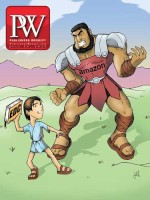When your publisher puts up the dough to send you on a 20-city national book tour, they’re expecting you to transform yourself from a hermitic wordsmith into a traveling salesman.
As ill suited as many authors are for this new role, it should not be as hard as many of us make it out to be. Unless you’ve written a terrible book, an author on book tour has what most traveling salesmen dream of—a product you actually believe in. Spare me the author who balks at the word “product.” To them, I say, “Turn your book around. See that bar code? That means it’s a product.” Products need to be sold.
Still, as much as I love my product, I do get tired of selling it, and I have a habit of selling other authors’ books when I’m supposed to be selling my own. I became aware of this one night during a reading at Boswell Book Company in Milwaukee, where I derailed my own q&a by admiring an audience member’s copy of Christopher Moore’s Sacré Bleu, a beautifully designed novel about the color blue, printed in blue ink. “Blue ink!” I cried, like I was selling Ginsu knives in a TV infomercial. “Can you imagine how much that cost his publisher?”
Without reading a single word of it, I’ll bet I sold five copies of Sacré Bleu that night. I sold it because I’d been sold it so well the night before by Whitney Spotts, a bookseller at Schuler Books in Lansing, Mich. Whitney, armed like so many good booksellers with a vast knowledge of books and an infectious enthusiasm for reading them, is a master of talking you into books you didn’t even know you were interested in. As someone unaccustomed to her kind, I was helpless in the presence of her powers.
You see, as a kid growing up in rural southern Ohio, I managed to live the first two decades of my life without setting foot in an independent bookstore. My love of books started in the public library, where as a kid I first experienced the magic of being surrounded by books—what I now call the “serendipity of the stacks.” Much of this serendipity was self-discovered: I don’t remember my mother ever really pushing any books on me, and I don’t think I ever in my life asked a librarian what I should read next. I didn’t need to be sold books, and I didn’t want to be sold books. Occasionally, a teacher or a friend would recommend something to me, but reading was mostly a solitary endeavor. Books led to other books.
When I was in high school, the Internet came along, and my major method of acquiring books was set: find books online, then order them from Amazon or the library. Why, I often wondered, should I care about the fate of independent bookstores when I have the Internet and a library card?
As Buddy Holly sang, “You don’t know what you’ve been a-missing, oh boy.” Your favorite blogger can sell you on a book with well-chosen words, but imagine that blogger standing among a handsome row of well-curated books in a good-smelling store, pulling a brand-new one off the shelf, handing it to you, and saying. “I think you’ll really like this.” There’s something beautiful about that human transaction that doesn’t really happen anywhere else, online or off.
Sure, it’s a little romantic, but romance is what publishing needs, and it’s exactly what you need on a book tour—night after night, talking about yourself. Flyleaf Books in Chapel Hill, N.C., or Changing Hands in Tempe, Ariz., or McNally Jackson in New York—each date of my tour, a somewhat jaded traveling salesman would walk into an independent bookstore thinking it was the same old gig, and each night the setting of the “salesroom floor” would transform that traveling salesman into what I really was: a wide-eyed reader, a lover of books. Seeing all those books and being sold those books by good booksellers reminded me that I was part of something bigger than myself. I even got excited about my own book again.
It took me going on this tour and discovering what independent bookstores have to offer to learn this lesson: the best salespeople are the ones who are in love. Whether they’re yours or not, if you love books, you can’t help selling them.
Austin Kleon is a writer and artist living in Texas. His book Steal Like an Artist, an illustrated manifesto for creativity in the digital age, was published by Workman in February.



 Volume 259
Issue 30
07/23/2012
Volume 259
Issue 30
07/23/2012





